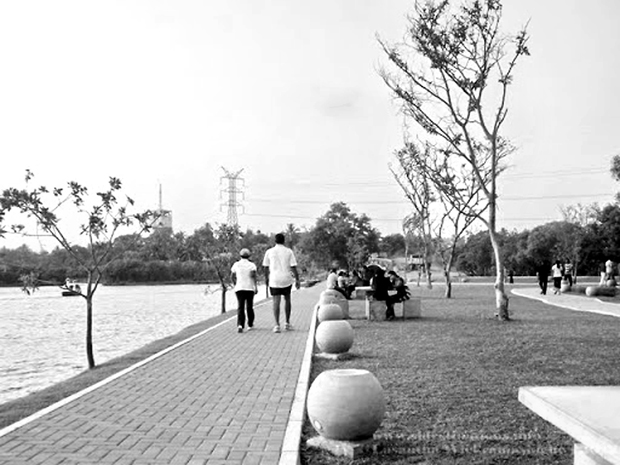Reply To:
Name - Reply Comment
Last Updated : 2024-04-24 21:59:00
 Much needed open spaces for relaxation for the public
Much needed open spaces for relaxation for the public
People in many parts of the world are increasingly critical of their governments and other elected political institutions at different levels including local councils. This is partly due to the increasing complexity of issues that these bodies are expected to address and the obvious shortcomings in their responses to such issues. On the other hand, it is difficult to imagine what alternative institutional arrangements are possible to cope with the persisting and emerging social, economic, cultural and environmental issues in modern societies. In fact, we have not seen an alternative to democratic governance as a way of managing public affairs in modern societies.
So the current public disenchantment with political institutions should not result in the overthrow of the democratic system but must prepare the ground for revamping it with a view to making it more accountable, responsive and effective in dealing with various issues that societies and citizens confront under diverse circumstances. In this article, I wish to deal with the lowest tier of government in this country and propose a strategy to make it more accountable, responsive and relevant from the point of view of local communities.
In Sri Lanka, we have a devolved system of government, largely on paper. In other words, governance structures exist at three levels, namely, central, provincial and local. In general, devolved systems of governance are based on the subsidiarity principle. But, in this country, we have failed to revamp our governance system accordingly. As a result, we continue to have an incredibly top heavy central government with a plethora of Ministries that not only divide subjects in an utterly arbitrary manner with serious adverse consequences but also duplicates functions at all levels resulting in utter waste of public funds and administrative confusion. But this is of little concern to people who have been elevated to positions at national level as their main preoccupation is with their powers and privileges.
The establishment of provincial councils in the nine provinces would have given us a great opportunity to decentralize development and social welfare programs but even areas devolved to PC’s remain dominated by the central government. Obvious examples are education, health and environmental management. The division of labour between central and provincial ministries would have been the focus of discussion in order to arrive at an optimal arrangement to manage and develop the relevant sectors better but instead almost the entire focus has been on the role of the central government ministries. The result is well known to citizens in this country.
Over-centralization of government functions not only devalues the role of lower tiers of governance  but also starves the latter of resources, both financial and technical. Under such conditions, lower tiers naturally become ineffective and even irrelevant from the point of local communities. This is where we stand today with respect to local government.
but also starves the latter of resources, both financial and technical. Under such conditions, lower tiers naturally become ineffective and even irrelevant from the point of local communities. This is where we stand today with respect to local government.
The 1998 Presidential Commission on Local Government Reform proposed certain crucial interventions to revamp the sector. Yet, not much has been done to date to implement the recommendations of the Commission. It is a tall order to expect the present crop of legislators and political leaders to pay much attention to this national issue as they are almost entirely preoccupied with the desire to maintain their own powers and privileges. So, any radical reforms like the ones effected by the 93rd amendment to the Constitution in India cannot be expected to materialize in this country any time soon. Hence, what is outlined below is a set of proposals that can be implemented without much effort.
Given the pathetic situation that prevails in many local council areas in the country, what is proposed is the minimum that powers that can be offered to the hapless masses in the country without waiting for radical constitutional reforms. A program can be developed and launched to mobilize local councils to address some of the pressing issues in order to make life more tolerable, predictable and enjoyable for local residents. In this regard, it should also be noted that some local councils are responding to local needs better than the others. What is needed is to set minimum standards for all of them. The areas that can be identified as priorities are as follows. They are:
The areas listed above may appear to be simple but a closer examination would reveal that they are complex and need careful analysis. A superficial glance at the list might also give the impression that they are already addressed by the local councils and therefore, we do not have to worry about them. The reality is far removed from such an impression.
Building regulation is an area that creates a great deal of anxiety, frustration and conflict for many people resident in local authority areas. Sorting out the problems involved would involve careful investigation and analysis before any systematic solutions to them can be found. Right now, the most important problems are the lack of technical capabilities and adequate Human Resources and corruption. The lack of adequate supervision and follow up create many technical and social problems that never get resolved though some of them end up in courts of law but many people suffer in silence due to lack of any remedies.
Today, most urban areas are too congested and crowded partly due to poor building regulation and partly due to increasing population pressure. Decreasing the size of building plots in many areas, leave little or no open space around dwelling units, even in middle class residential neighbourhoods, let alone the poor ones.
This situation demands local authorities to ensure that there are adequate public open spaces near residential neighbourhoods. Yet, instead, what many local authorities in fact have done is to even violate basic zoning principles and authorise large commercial and business establishments in residential areas, making life miserable for local people due to increased traffic, air pollution, etc. In fact, some of these larger land plots would have been converted into public spaces and neighbourhood parks. While it is too late for such rational and humane use of space in many urban areas, the practice should be brought to an end at least now so that, where it is still possible, open public spaces and parks can be established for the use of local residents. It is not necessary to mention here that such a practice would naturally improve the quality of life of people.
The conditions outlined under (a) and (b) above are not conducive to improving public health at a local level. There are of course many other factors that impinge on public health. These include the lack of effective maintenance of the built environment. Efficient disposal and management of solid waste, storm water management, and regular maintenance of roads, provision of adequate drinking water and sanitation facilities in public places are critically important as integral aspects of the built environment but often fall far short of public expectations in most urban areas.
Another area that is often neglected is social infrastructure. These include facilities provided for such groups as children, youth, the elderly, the disabled and the homeless. Of course, here there is an overlap between the functions of central and provincial authorities and those of local councils but the maintenance of such facilities can be done most effectively by the local authorities. The elements of social infrastructure are too numerous to enumerate and discuss here for want of space but it is necessary to emphasize that local councils have a key responsibility with regard to social infrastructure. But what is obvious to any keen observer is that there are not many services provided by local councils to cater to the needs of the above groups. For instance, take children. What are the services local councils provide for their benefit? One can ask the same question with respect to other groups listed above. The answer is likely to be the same. This lacunae naturally frustrates local residents and contributes to public disenchantment.
India’s Panchayat Raj system has played considerable attention to the need for citizen participation in the management of local affairs including the identification of projects to be implemented by local councils. This has been made meaningful by the provision of adequate budgetary provisions and the close scrutiny made possible by the right to information legislation.
We have no such arrangements here though proposals were made to such effect by the 1998 Commission report. Without effective and meaningful participation of local people in the affairs of the Local Councils, it would not be easy to rectify the persisting problems in the area of local governance.
So far in the present article, I have made an effort to outline a minimum programme for local councils so that the latter can be made relevant and responsive to the needs of local people in the next few years, until the sector is developed to its full potential in keeping with international best practices with regard to local governance.
It is hoped that such a programme would be implemented by the authorities at least as a pilot project on a competitive basis with the support of some international agencies. Based on the experience of such a pilot project, a national programme could be developed and implemented across the country in the near future.

Add comment
Comments will be edited (grammar, spelling and slang) and authorized at the discretion of Daily Mirror online. The website also has the right not to publish selected comments.
Reply To:
Name - Reply Comment
US authorities are currently reviewing the manifest of every cargo aboard MV
On March 26, a couple arriving from Thailand was arrested with 88 live animal
According to villagers from Naula-Moragolla out of 105 families 80 can afford
Is the situation in Sri Lanka so grim that locals harbour hope that they coul